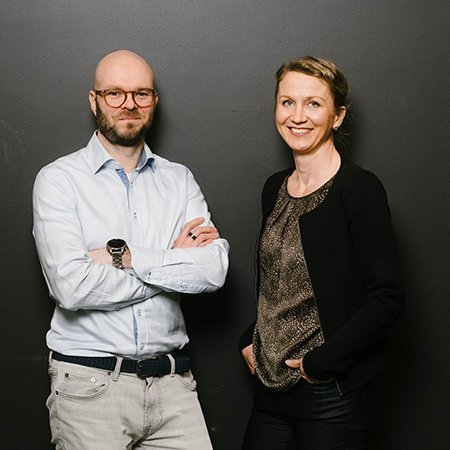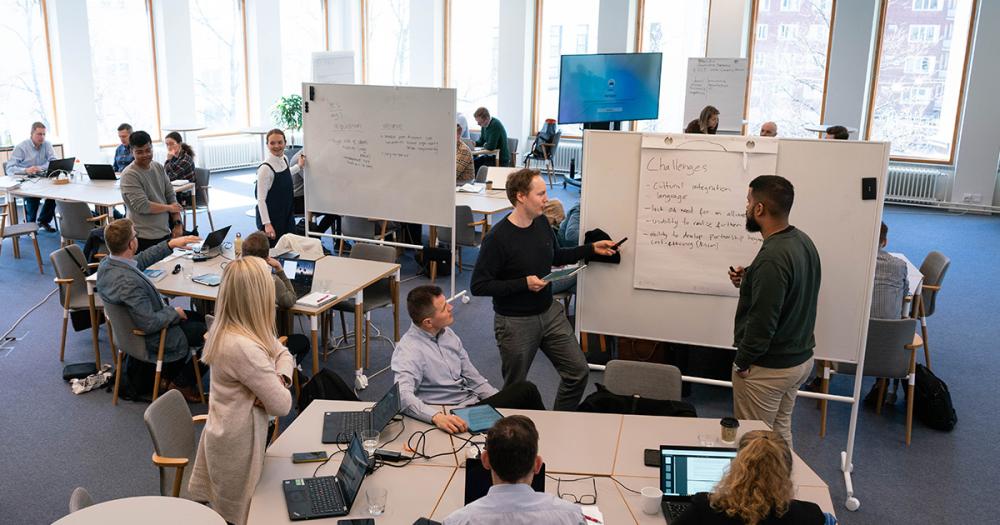Success Through Strategic Cooperation Between Production and Procurement
Ensuring business continuity in today's dynamic environment demands strategic foresight and informed decision-making. To succeed in global markets, it is essential to have a business strategy that includes collaboration between production and procurement. Our training programs provide you with the essential skills to plan, manage, and develop your production, procurement, and supply chain operations. We focus on developing efficient operations and processes for both local and international businesses, including the effective management of external resource networks.
What kind of training or development are you looking for?
Customized Competence Development Solutions
With over 50 years of experience, Aalto EE develops world-class competence development solutions that utilize Aalto University’s multidisciplinary faculty and approach.
We co-create with organizations' impactful and inspirational training solutions and help our customers to address current and future business challenges.
Aalto EE's customized solutions are an impressive way to renew organizations and competencies, ensure strategy implementation, and build a new competitive advantage. Together with our corporate clients, we design and implement customized training where all aspects are always organized according to the customer's needs.
Psychologist Debunks the Myth of Efficiency: "Our Brain Doesn't Function That Way"
Psychologist Mona Moisala suggests that knowledge workers should hear what neuroscience has to say and give up the detrimental demands of our seemingly efficient ways of working. Do you dare to take a nap during the workday?
Does Generative AI Make Work Smarter or Harder?
Professor Henri Schildt from Aalto University says that generative AI makes employees more productive, creative, and eager to learn. He himself asks the AI for criticism or tips on simplifying complicated things.
Read Customer Experiences

Taina Kokkarinen & Tuukka Hartikka
Helen Ltd."It’s important that people understand where the shift is heading. Hydrogen Business Basics offers an excellent foundation for that."

Ilkka Mäkinen
COO, NTG Road"I gained practical tools for optimizing daily operations and a comprehensive understanding of current trends and opportunities in international logistics."
Online Courses on Operations Management and Quality
Fundamentals of Supply Chain Management
This online course focuses on the interphase between different organizations and ways to manage it. The course will take you through a journey that covers the understanding of what is Supply Chain Management. Course language: English
Estimated Study Time: 10 hours
Product added to cart


Schedule Estimated Study Time: 10 hours
Location E-learning environment
This online course focuses on the interphase between different organizations and ways to manage it. The course will take you through a journey that covers the understanding of what is Supply Chain Management. Course language: English
Fee: € 200 (+ VAT)
Osta käyttöoikeus
System Dynamics as a Modelling Tool for Engineering and Manufacturing
This two-hour Aalto EE Master Class delves into the principles and applications of System Dynamics as a modelling tool. After this Master Class, you will have a basic understanding of how to model dynamic systems and how they can be applied in the engineering and manufacturing space.
Study time: 2 hours
Product added to cart


Schedule Study time: 2 hours
Location Online
This two-hour Aalto EE Master Class delves into the principles and applications of System Dynamics as a modelling tool. After this Master Class, you will have a basic understanding of how to model dynamic systems and how they can be applied in the engineering and manufacturing space.
Fee: € 50 (+ VAT)
Osta käyttöoikeus
Meet Our Faculty

Kari Tanskanen
Kari Tanskanen is Professor of Industrial Economics, Supply Chain Management, and Procurement Management at the Aalto University School of Science.

Teemu Malmi
Teemu Malmi is a Professor of Accounting and Head of the Department of Accounting at Aalto University School of Business.
Professor Malmi specializes in management systems, strategy implementation, and cost and profitability accounting. He teaches frequently in a variety of Executive Programs and has served as an advisor to a large number of companies from various different industries: IT, electronics, energy, finance, food, health care, media, metal and engineering, paper and pulp, pharmaceuticals, rental services, retail, telecom and transportation/logistics and the public sector.
Teemu Malmi holds a Ph.D. in Accounting and Finance from The Helsinki School of Economics, which was merged into Aalto University in 2010.

Katri Kauppi
Katri Kauppi is a tenured Associate Professor of Logistics and Supply Chain Management at Aalto University School of Business.
Kauppi has previously worked at Nottingham University Business School and Manchester Business School in the UK where she has also taught in Global MBA-programmes in e.g. Dubai, Shanghai, Hongkong and Miami. Prof Kauppi teaches in the areas of sustainable supply chain management, procurement and sourcing as well as supply chain risk management
Prof. Kauppi’s research interests include organizational purchasing behaviour, supply chain failure causes and consequences, social sustainability certifications, climate change risk mitigation in supply chains as well as public procurement. Prof Kauppi’s has received several recognitions from her research work and also the World Culture Council Special Recognition Award for a young scientist who early in their career has made an international impact through their research.

Harri Lorentz
Harri Lorentz serves as an Associate Professor of Purchasing and Supply Management at the University of Turku.
His research interests are currently concentrated on digitalization of procurement, procurement capabilities, as well as on supply market intelligence. In the past, Dr. Lorentz has been affiliated with the University of Cambridge (Senior Research Associate) and Manchester Business School (visiting researcher) in the UK. He also has practical experience from food export operations as well as World Bank led trade and transport facilitation projects in the CIS countries. Dr. Lorentz has published in several leading international journals, such as Journal of Supply Chain Management, Supply Chain Management: An International Journal, International Journal of Physical Distribution & Logistics Management, International Journal of Production Economics, Journal of Purchasing and Supply Management and Industrial Marketing Management.
Lorentz received his doctoral degree in international business in 2009 from University of Turku.

Jussi Heikkilä
Jussi Heikkilä is Professor of Strategic and Operational Management of Production at the Faculty of Management and Economics, University of Tampere.
Heikkilä specialises in supply chain and production process research, focusing on supply chain risk management and efficiency improvement.

Gautam Basu
Gautam Basu is a Professor of Practice in Logistics at the Department of Information and Service Management of the Aalto University School of Business.
Basu's interests and specialization lie within Supply Chain Operations Management, Digital Operations, Supply Chain Risk Management, Business Analytics, and Operational Value Creation in Private Equity.

Max Finne
Max Finne is an Assistant Professor of Information and Service Management at Aalto University School of Business.
Max Finne is an operations, projects, and supply chain management expert. He has specialized in servitization, Industry 4.0, service network management, professional service operations, inter-organizational collaboration, learning analytics, and flipped learning pedagogies. Finne has taught in several Warwick Business School’s prestigious Executive, Full-time, and Distance Learning MBA Programs before joining Aalto University. Even the most demanding student cohorts highly appreciate Finne’s teaching and have awarded him the highest student feedback of the whole teaching team on many occasions.
He has carried out close research collaboration with companies such as ABB, Costain, Finnair, Fujitsu, KONE, NCC, and Skanska. He delivers innovative and engaging teaching with a high impact on learning, showcased through his winning the distinguished Nigel Slack Teaching Innovation Award in 2015, 2016, and 2018.
Max Finne has been awarded Postgraduate Certificate in Academic and Professional Practice with distinction (1st-class honors) from the University of Warwick. It gave him full pedagogical qualification to teach in the UK Higher Education and recognition as a Fellow of the Higher Education Academy.

Timo Seppälä
D. Sc (Industrial Economics) Timo Seppälä serves as a University Lecturer in Operations Management at Aalto University.
Seppälä’s research focuses on global value chains, supply chain management, digital operations, and platform economy in technology and service-based businesses.
He acts as a trainer and expert in programs in the areas of operations management, supply chain management, and digitalization. His research has been published in international journals such as the Journal of Operations Management, Supply Chain Management: An International Journal, Industry and Innovation, and California Management Review.
He has over 20 years of business experience from various Finnish and international companies, including Metso, OMG Kokkola Chemicals, Oracle, Elcoteq, and lately, Koja Group, where he serves as Chairman of the Board.

Marja Blomqvist
Marja Blomqvist is a consultant, trainer and lecturer and works as a university lecturer at the University of Turku.
His professional interest is in helping organisations to improve their own performance. Related topics include Lean thinking, production management and systems, service production and process management, process development, and leadership.
Blomqvist has been a consultant and partner in QDC Business Engineering Oy since 2005. Prior to QDC, he held development positions in industry.
Blomqvist holds a Licentiate of Technology and a Master of Science in Engineering and is a CSCP, Certified Supply Chain Professional, APICS.

Lauri Saarinen
Lauri Saarinen is an Assistant Professor of Operations Management at Aalto University.
Lauri Saarinen is an expert in data analytics-based operations management, process improvement and planning of operations. He focuses in research and teaching on creating value with analytics using companies’ operational data and has specialized on questions related to value of local production, international supply chains and process improvement. Saarinen engages actively with industry with a goal to understand the edge of developing operations management and process improvement in practice.
He has carried out research work with companies from Finland, Switzerland and United States ranging from heavy industries to consumer electronics and healthcare. Saarinen develops new applied analytics teaching at Aalto and his teaching portfolio includes advanced operations management, operations strategy and statistical and quantitative methods for managers. Prior to arriving to Aalto, Saarinen gained experience at University of Lausanne taking part in M.Sc. and EMBA teaching. The students of Industrial Engineering at Aalto University chose Lauri as the Teacher of the Year in 2021 and Lauri was awarded the Teaching excellence award for the year of 2021 by the faculty of the Industrial Engineering Department.
Before joining the academia, Lauri worked in supply chain management, inventory and production planning optimization. He continues to work with industry engagements focusing on process analysis and improvement, analytics in operations and planning solutions.
Contact Us



















